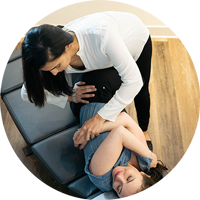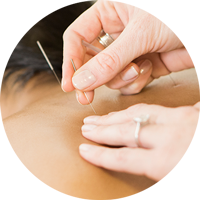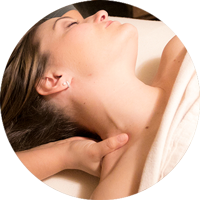What is TMJ?
TMJ (Temporomandibular) Disorder – often referred to as Temporomandibular Joint Dysfunction or Syndrome – describes the pain and/or limited movement in the jaw joint and the muscles that surround it. The temporomandibular joint connects the jaw to the skull (or the mandible to the temporal bone), right in front of the ear.
Discomfort associated with TMJ may expand beyond the jaw, into the mouth, ear or face. Jaw clicking, difficulty chewing, pain and “lock jaw” may also be chronic symptoms of TMJ, or may resurface from time to time, as muscle spasms or limited range of motion.
The specific cause of any individual’s TMJ dysfunction isn’t always easy to identify. Genetics may play a role in jaw placement and bite, which can affect how you chew and utilize the joint. Clenching the jaw as a response to physical or emotional stress may also exasperate or trigger TMJ syndrome. Injury and arthritis can play a role.
How can I tell if I have TMJ?
You may want to take advantage of a free consultation with one of our licensed acupuncturists or chiropractors for an accurate assessment. (We have availability for these 15-minute consults 6 days a week!) Acupuncture can help relieve, reduce symptoms of, and even eliminate TMJ, depending on your specific case. By increasing circulation and blood flow to all areas of the body, relaxing overworked muscles and encouraging mobility in the jaw joints, acupuncture has been shown to be an extremely effective remedy.
Symptoms of TMJ
Common symptoms of TMJ include:
- Clicking or locking of the jaw (“lock jaw” “stuck jaw”)
- Pain in the jaw and surrounding muscles
- Aches in the face, the ears, mouth
- Popping or “crackling” joints
- Trouble chewing
- Pain when chewing
- Chronic toothache
- Chronic headache
- Muscle spasms in the jaw, face or neck
- Notable pressure on the jaw joint
- Swelling on the side(s) of your face
- Facial muscles feeling tired
- Inability to open the mouth wide
- A feeling as though the upper and lower teeth don’t fit together well
- Dizziness
- Hearing problems or earache
TMJ syndrome may begin as any one of these symptoms, or may become more noticeable as the symptoms display together.
Causes of TMJ
While the causes of TMJ aren’t completely defined, a number of things may contribute to the onset of pain and discomfort:
Inflammation & Irritation
- The pain experienced with TMJ is most often a result of inflammation in the jaw joint. The irritation can stem from grinding your teeth, clenching your jaw, or frequently chewing gum, which can apply excess pressure to the joint.
Family History / Genetics
- The inflammation causing symptoms of TMJ can stem from a misalignment of the teeth or bite, which is genetic. Overbites and underbites can trigger grinding of the teeth, which will irritate the joint in time.
Stress
- Because clenching the jaw and grinding the teeth are often natural stress responses, lifestyle may increase your risk of experiencing TMJ disorder.
- Tension headaches can also trigger TMJ dysfunction.
Poor Posture
- Believe it or not, poor posture can impact TMJ syndrome because the muscles around your head, neck, shoulders and jaw may become overworked and cause the joint to become inflamed.
Arthritis in the Joint
- Small movements of the disc in the ball and socket joint can cause inflammation there.
Injury
- Jaw injury or whiplash can tighten facial muscles, jaw muscles, and cause irritation around the jaw joint.
Treatment with Acupuncture & Chiropractic Care
Acupuncture
Since TMJ can stem from an accumulation of tightness in the jaw or facial muscles, acupuncture can alleviate symptoms of pain and discomfort right away. Specifically, tiny needles can allow the trigger points of tender facial muscles to release.
Acupuncture can also regulate hormonal imbalances and blood flow, which can be as effective, if not more so, than prescription drugs in stress reduction. Acupuncture is an effective treatment for joint inflammation, dysfunction and pain.
Acupuncture has been used to improve circulation and reduce inflammation in the body for more than 2,000 years. Although it is relatively new to Western medicine, acupuncture is an increasingly common prescription for TMJ pain and discomfort. It can be an effective supplement or complement to other therapies, by helping to improve circulation in the body, boosting its immune and nervous systems, and by allowing for more mobility in the joints.
Our acupuncturists at Aligned Modern Health bring together the best of traditional therapies and evidenced-based medicine using the latest science and technology available. Working as industry leaders, acupuncturists are top-rated and proud to provide unparalleled health care in noninvasive, comprehensive treatments for migraines.
Chiropractic
Chiropractic care that allows for pain relief by releasing tension in the jaw joint and/or facial muscles can also help reduce and prevent symptoms of TMJ.
Our chiropractors perform spinal adjustments in conjunction with active rehabilitation exercises and therapy. Simple, doctor-recommended, jaw stretches, coupled with manual therapy and followed by heat or cold packs can help reduce both muscle tension and inflammation in the joint.
To schedule a free consultation, click here!
Schedule
Please fill out the form to request an appointment at our health and wellness center for the service and location of your preference. We try to get back to all requests as quickly as possible. If you need immediate assistance, please call 773-598-4387.
Your safety comes first: we are operating with heightened safety measures in our clinics and offer telemedicine for those unable to visit in person.






